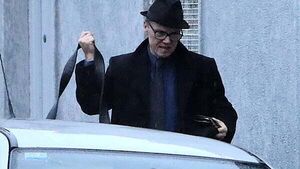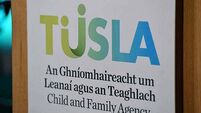Acquitted law professor Diarmuid Phelan in legal fight with State over 'enormous' trial costs

Alison O'Riordan
The State appears to have suggested that even people of means should make legal aid applications, which a barrister for law professor Diarmuid Phelan, who was acquitted by a Central Criminal Court jury of murdering a trespasser on his farm, has argued is "entirely contrary" to spirit of the scheme.
A judge will give her ruling in September as to whether the State should pay the "enormous" legal costs for Mr Phelan following a trial that ended last January.
The costs issue was raised this evening on the last day of the Trinity term before Ms Justice Siobhan Lankford, who presided over the 10-week murder trial that ended on January 3rd last.
Law lecturer Mr Phelan, who has assets valued in the millions, instructed two senior and two junior counsel at his trial and did not receive legal aid. He also called expert witnesses who gave evidence following the close of the prosecution case.
Mr Phelan maintained from the outset that he had no intention of shooting the deceased Keith Conlon and had acted in self-defence when he fired three warning shots. The jurors unanimously agreed with the defence case following the trial that Mr Phelan was entitled to defend himself when he came under threat on his own land.
Mr Phelan (56) went on trial in October 2024 after he pleaded not guilty to murdering father-of-four Keith 'Bono' Conlon (36) at Hazelgrove Farm, Kiltalown Lane, Tallaght, Dublin 24 on February 24, 2022.
Mr Conlon from Kiltalown Park in Tallaght, was seriously injured in the shooting incident on February 22 and died at Tallaght University Hospital two days later.
The defendant is a barrister, law lecturer and farmer who owns Hazelgrove, formerly a golf course in Tallaght.
It was the defence case that this was an unintended killing and what Mr Phelan had been trying to achieve in discharging the shots was not to strike Mr Conlon.
Opening the application on Thursday evening, Sean Guerin SC, who was one of two senior counsel representing Mr Phelan at his trial, told Ms Justice Lankford that the starting point - and also expressly the most important consideration - in awarding costs was the verdict.
Counsel submitted that Mr Phelan was entitled to his costs and the onus was really on the prosecution to show why he shouldn't succeed in the application. He said there was no substantive reason as to why costs should not be awarded.
Mr Guerin said one of the prosecution's submissions, which had previously been handed into the court, was that Mr Phelan had the option of applying for legal aid but had chosen not to do so. The lawyer said legal aid had been put in place because of the desperate injustice done to people who couldn't secure the means to defend themselves and to protect those of limited resources.
The barrister said the State appeared to be suggesting that even people of resources or means should make a legal aid application, which he suggested was a complete misunderstanding of what the legal aid scheme was. "There is no suggestion of that in the authorities and is entirely contrary to the word and spirit of the statutory scheme of legal aid," he added.
Mr Guerin went on to say that the personal financial consequences was that Mr Phelan had to bear "the enormous costs" of being on trial in the Central Criminal Court for nearly three months. "The court doesn't need to be told what those financial consequences are and how they weigh on anyone who has to meet their defence".
Opposing the application, John Byrne SC, for the Director of Public Prosecutions (DPP), argued there was no presumption in favour of costs and one cannot simply say they had been acquitted so were entitled to their costs. He said a more complex and nuanced enquiry was required by the trial judge.
The barrister said an award of costs is a discretionary order and it was "too simplistic" to say an acquittal gives rise to a presumption in favour of costs being awarded.
Ms Justice Lankford said she had not finalised her view in relation to awarding costs but asked both parties to articulate their views if she decided to award Mr Phelan his costs but confined it to legal aid costs. She noted there was quite a wide discretion in case law, where 50 per cent of costs had been awarded to applicants.
Mr Guerin told the judge there was no warrant for doing so as those weren't the costs his client had incurred. He said legal aid was not a guide or a measure as to what are the appropriate costs in a case. "If the court concluded Mr Phelan is entitled to his costs, then the appropriate order is for the adjudication of those costs in the usual way".
Whereas, Mr Byrne said the discretion seemed to be very wide and awarding legal aid costs was not something the court couldn't do, provided it set out the basis for it.
Ms Justice Lankford said she hoped to deliver the court's judgement as to whether Mr Phelan can recoup his legal costs from the State in the first week of September.
Mr Phelan's trial heard that Keith Conlon and others were trespassing on Mr Phelan's land at Hazelgrove Farm, Kiltalown Lane in Tallaght on February 24, 2022. Mr Phelan shot a dog belonging to one of the trespassers due to concerns the dog might go after his sheep.
An angry confrontation followed in which Mr Phelan produced a handgun and fired three shots, the third of which struck Mr Conlon in the head and caused his death. Mr Phelan said he acted in self-defence and that the fatal shooting was accidental.
The jury had rejected the State's case that when the third shot was fired by Mr Phelan, the gun was pointed in the direction of Mr Conlon, who was shot in the back of the head when it was argued he had turned away to leave. It was in those circumstances, the prosecution said, that Mr Phelan intended to either kill or cause serious injury to Mr Conlon.
Instead, the jurors accepted Mr Phelan's position that he was acting in self-defence after two trespassers were "coming to fulfil the threats they had made" and that he was fearful and facing an "imminent attack" as the men closed in on him.




